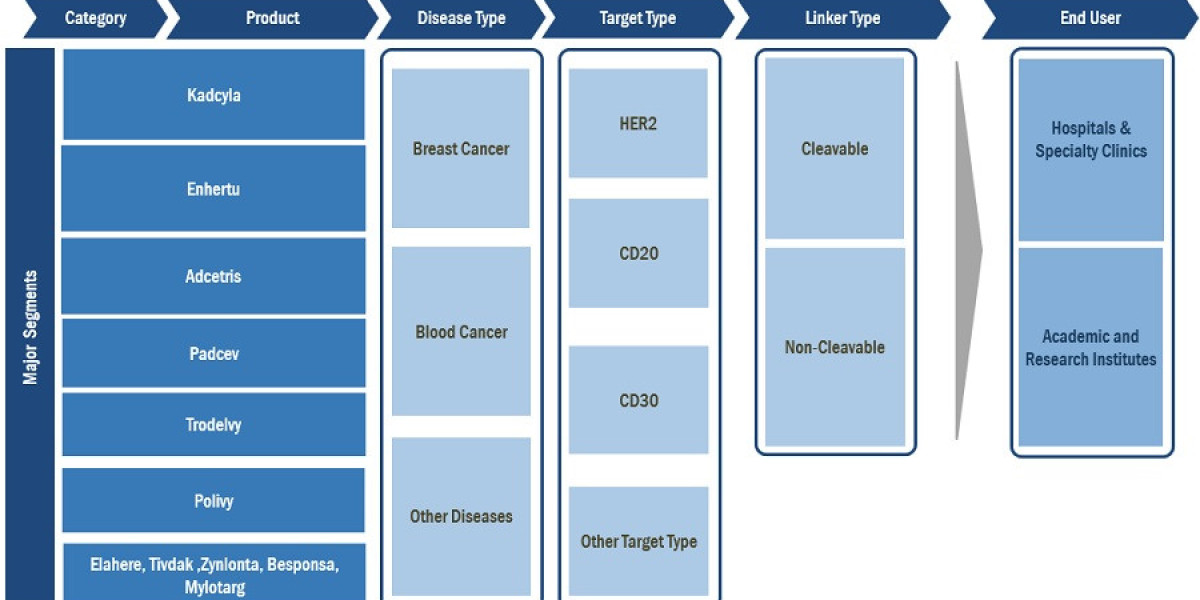The global antibody drug conjugates market in terms of revenue was estimated to be worth $9.7 billion in 2023 and is poised to reach $19.8 billion by 2028, growing at a CAGR of 15.2% from 2023 to 2028. The new research study consists of an industry trend analysis of the market. The new research study consists of industry trends, pricing analysis, patent analysis, conference and webinar materials, key stakeholders, and buying behaviour in the market. Growth in the market can be attributed to various factors such as including the growing prevalence of cancer, and increasing R&D activities for the development of novel ADCs by key market players. Antibody-drug conjugates represent a highly potent approach to treating cancer patients. They harness the precision of monoclonal antibodies, directing them towards specific antigens, to deliver potent cytotoxic drugs. This approach enhances drug effectiveness while minimizing the adverse effects typically associated with traditional chemotherapy.
Key players in the antibody drug conjugates market include F. Hoffmann-La Roche Ltd (Switzerland), Daiichi Sankyo Company, Limited (Japan), Seagen Inc. (US), Gilead Sciences, Inc. (US), Takeda Pharmaceutical Company Limited (Japan), Pfizer Inc. (US), Astellas Pharma Inc (Japan), AstraZeneca (UK), ADC Therapeutics SA (Switzerland), ImmunoGen, Inc. (US), Zydus Group (India)
Download the PDF Brochure at https://www.marketsandmarkets.com/pdfdownloadNew.asp?id=122857391
Opportunity: Adoption of combination therapies
Combination therapies utilizing antibody-drug conjugates offer significant market growth potential and are an appealing strategy for both existing and growing pharmaceutical & biotechnology businesses. ADCs have been actively studied in combination with other anticancer agents such as chemotherapy, targeted therapy, immunotherapy, and anti-angiogenic agents in recent years. The drug combinations including anti-angiogenic medicines, HER2-targeted medications, DNA damage response agents, and immune checkpoint inhibitors (ICIs) are currently in active research. More recently, strategies for combining immunotherapy with ADCs have also entered clinical studies. There is growing evidence that ADCs can improve immunotherapy efficacy by inducing immunogenic cell death, dendritic cell maturation, increased T-lymphocyte infiltration, enhanced immunological memory, and the production of immunomodulatory proteins such as PD-L1 and MHC.
Challenge: Technical complexities
ADCs comprise a tumor antigen-specific antibody, a potent cytotoxic payload and a stable chemical linker that joins the antibody to the cytotoxic drug. The individual characteristics and risks associated with these three components present unique challenges and pose considerable risks at multiple levels. Achieving an optimal balance between the potency of the cytotoxic drug and the specificity of the antibody is one of the major issues. Another challenge is the potential for toxicity, particularly in non-target tissues. The cytotoxic payload can cause damage to healthy cells, leading to adverse effects and limiting the potential use of ADCs in treating certain cancers. Further, the process of bioconjugation is complex, and there are numerous factors that can affect the stability of the final product which can impact the efficacy and safety of the ADC. The advancements in linker and payload technologies and the emergence of new manufacturing technologies helped to overcome such challenges in ADC development.
The Kadcyla segment of the antibody drug conjugates industry held the dominant position in 2022.
On the basis of product, the global antibody drug conjugates market is segmented into Kadcyla, Enhertu, Adcetris, Padcev, Trodelvy, Polivy and Others. The Kadcyla segment dominated the antibody drug conjugate market during the forecast period. The rising prevalence of breast cancer coupled with increased approvals for the ADCs for breast cancer treatment are some of the factors driving the market growth.
Blood Cancer Segment of the antibody drug conjugates is likely to grow at significant CAGR during the forecast period.
On the basis of disease type, the global antibody drug conjugates market is segmented into breast cancer, blood cancer and others. The breast cancer segment dominated the market in 2022 owing to various factors such as increased adoption of ADCs for treatment by patient population. The increasing number of clinical trials on ADCs for breast cancer and the recent approvals of ADCs target indications, such as blood cancer, lung cancer, cervical cancer, and ovarian cancer among others is further expected to project the market growth at faster pace.
Direct Purchase at https://www.marketsandmarkets.com/Purchase/purchase_reportNew.asp?id=122857391
Asia Pacific region of the antibody drug conjugates industry is likely to grow at the highest CAGR during the forecast period of 2023-2028.
The antibody drug conjugates market is segmented into five major regions—North America, Europe, the Asia Pacific, Latin America, and the Middle East & Africa. In 2022, North America accounted for the largest share of the market, and this trend is expected to continue during the forecast period. A robust product pipeline and increased regulatory approvals of ADCs are likely to propel the market growth in the region. Asia Pacific segment is likely to grow at a higher CAGR owing to various factors such as the increasing number of cancer cases coupled with the rise in the use of ADCs for the treatment of cancer. Furthermore, the launch of biosimilar Ujivra by Zydus is likely to have a positive impact on the market growth in the coming years.








